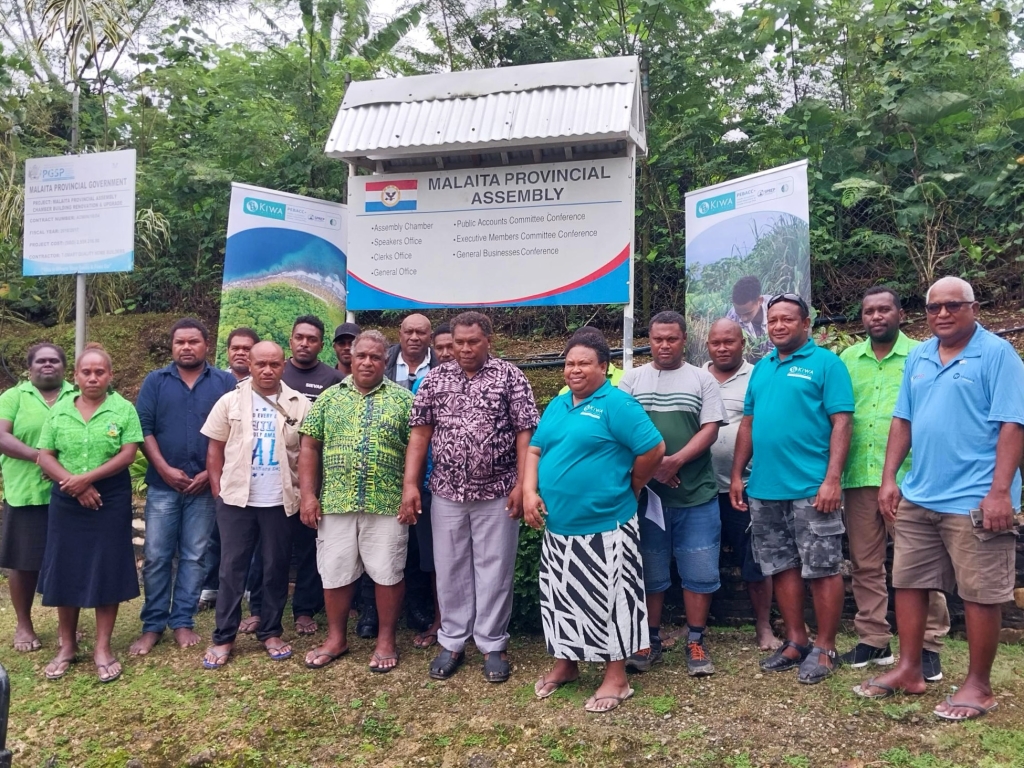
Malaita Province, Solomon Islands – The Malaita Province in the Solomon Islands recently held an inception workshop for the Pacific Ecosystem-based Adaptation to Climate Change (PEBACC+) Project in Auki. The PEBACC+ project will help strengthen the resilience of ecosystems, economies, and populations of Solomon Islands to the impacts of climate change by carrying out a provincial Ecosystem and Socio-Economic Resilience Analysis and Mapping (ESRAM) assessment and implement Ecosystem-based Adaptations (EbA) options in Small Malaita and Maramasike Passage.
The PEBACC+ Project is implemented by the Secretariat of the Pacific Regional Environment Programme (SPREP) and funded by the Kiwa Initiative and the French Facility for Global Environment (FFEM). The inception workshop was convened in collaboration with the Ministry of Environment, Climate Change, Disaster Management & Meteorology (MECDM), the Malaita Provincial Government and SPREP.
The Malaita Provincial Government Deputy Premier, Honourable Joe Hero’au stated in his opening remarks, “The project is vital for the sustainability of community people’s livelihoods as they interact with nature daily.” He further encouraged communities to take ownership of the project.
The MECDM Deputy Secretary Techical, Mr. Chanel Iroi stated that Solomon Islands categorised as a Least Developing Country and Small Island Developing State is highly vulnerable to the impacts of climate change and noted the need to take national actions to address climate change impacts and the need to protect the environment.
Mr. Iroi further highlighted the importance of nature-based solutions and EbA to address climate change impacts. He called on partners present at the workshop including national government, provincial government, and communities to strengthen partnership and work together to ensure the PEBACC+ project achieves its desired goals and objectives.
The workshop included community representatives from the Maramasike Passage and South Malaita, stakeholders such as the Malaita Provincial Government offices of Forestry, Fisheries, Agriculture, Planning, Provincial Disaster Office and Malaita-based Non-Government Organisations, USAID Strengthening Competitiveness Agriculture and Livelihoods (SCALE), Save the Children and World Vision.
PEBACC+ Project Country Coordinator for Solomon Islands with SPREP, Ms. Joanne Aihunu said, “The inception workshop for Malaita Province is a third of a series of workshops for Solomon Islands to bring together key stakeholders, to enable learning, sharing of lessons and ensure PEBACC+ builds on existing and past initiatives such the Pacific Adaptation to Climate Change and Resilience Building (PACRES) Project funded by the European Union with support from Monaco and the Swiss Confederation.

She added, “Overall in the Solomon Islands, PEBACC+ Project will support ecosystem and forest rehabilitation activities and the Information Centre at the Barana Community Nature and Heritage Park; it will also support the Honiara Botanical Garden in landscaping and capacity development; as well as conduct provincial and local ESRAM assessment and implement EbA options in Small Malaita and Maramasike Passage, Malaita Province.”
The PEBACC+ Project Inception Workshop for Malaita Province was held on 4 October 2023 in Auki.
The project is a €5.8 million regional project implemented by SPREP and funded by the Kiwa Initiative through its donors the European Union, Agence Française de Development (AFD), Global Affairs Canada, Australian Government Department of Foreign Affairs and Trade (DFAT) and New Zealand Ministry of Foreign Affairs and Trade (MFAT) – with co-financing from the French Facility for Global Environment (FFEM). This four-year project seeks to strengthen the resilience of ecosystems, economies, and communities to the impacts of climate change in Fiji, Vanuatu, Solomon Islands, New Caledonia, Wallis and Futuna. The project will develop, sustain, and institutionalise Ecosystem-based Adaptation to climate change in these five countries and territories.